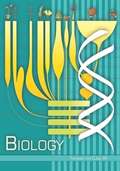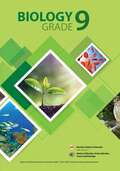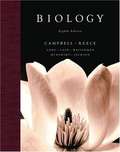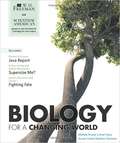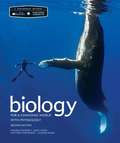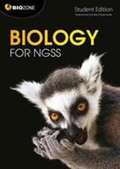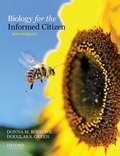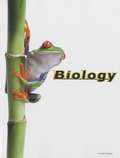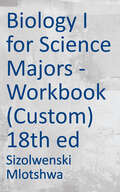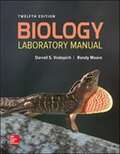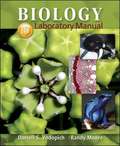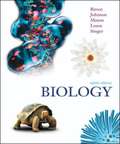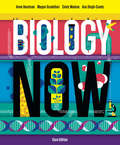- Table View
- List View
Biology class 10 - SCERT - Kerala Board: ജീവശാസ്ത്രം മലയാളം മീഡിയം ക്ലാസ് 10 എസ്.ഇ.ആര്.ടി കേരള ബോര്ഡ്
by Kerala ScertBiology Malayalam Medium Class 10 SCERT Kerala Board 1 is divided into four parts. The lessons cover sense organs, brain and nervous systems, hormones and their actions and finally the diseases and reasons. The topics are presented with detailed illustraions and images and tables.
Biology class 11 - NCERT - 23
by National Council of Educational Research and TrainingThe NCERT Biology textbook for Class 11 provides a comprehensive introduction to the vast and intricate world of living organisms. It begins with an exploration of what defines life and delves into the rich diversity and classification of living beings. The textbook introduces the concept of taxonomy and the tools associated with it in "The Living World" chapter. Following this, it presents a detailed five-kingdom classification system in the "Biological Classification" chapter, discussing entities that challenge traditional classification, such as viruses, viroids, and lichens. In the "Plant Kingdom" chapter, students are acquainted with the diverse groups of plants and their unique characteristics. Throughout, the text emphasizes the interconnectedness of life and the importance of understanding the natural world's complexities. This foundational knowledge sets the stage for more advanced biological studies in subsequent grades.
Biology class 12 - Meghalaya Board
by Meghalaya Board of School EducationThe class 12 Biology textbook deals with the physiological process of reproduction in flowering plants and humans, the principles of inheritance, the nature of genetic material and its function, the contributions of biology to human welfare, basic principles of biotechnological processes and their applications and achievements.
Biology class 12 - NCERT
by National Council of Educational Research and TrainingThe Class XII Biology textbook deals with the physiological process of reproduction in flowering plants and humans, the principles of inheritance, the nature of genetic material and its function, the contributions of biology to human welfare, basic principles of biotechnological processes and their applications and achievements.
Biology class 9 - MIE
by Mauritius Institute of EducationThe Grade 9 Biology textbook from the Mauritius Institute of Education covers four comprehensive units. The first unit delves into the intricacies of the human Blood Circulatory System, exploring the structure and functions of blood, the heart, and blood vessels. It addresses topics like blood cell types, pulse, and cardiovascular diseases. The Reproduction unit explores both asexual and sexual reproduction in living organisms, detailing the structures and functions of human male and female reproductive systems, fertilization, embryo development, and the significance of reproductive health. The Biodiversity unit introduces the concept's importance for survival, explaining how to estimate species using quadrats and addressing factors affecting biodiversity. The final unit, Nutrition in Plants, delves into photosynthesis, emphasizing factors like light, carbon dioxide, water, and chlorophyll, and includes practical demonstrations on starch presence in leaves.
Biology class 9 - Telangana Board: బయాలజీ క్లాస్ 9 - తెలంగాణ బోర్డు
by T.V.S. Ramesh Srimati K.V.S. Jagadeeswari Sri V. Raghavarao Dr S. Vishnuvarthan Reddy Sri Meda. Hariprasad Sri. Noyal Joseph Sri. Sanjiv Kumar Sri. Pramod Kumar Padhi Sri. S.K. Thaj Babu Sri. P. Vijaya PrathapThis is the text book prescribed for Biology to the students of 9th class, Telugu Medium in Telangana.
Biology (Eighth Edition)
by Neil A. Campbell Jane B. Reece Lisa A. Urry Michael L. Cain Steven A. Wasserman Peter V. Minorsky Robert B. JacksonBiology, Eighth Edition, serves students as a textbook in their general biology course and also later as a useful tool for review and reference. It encourages students to practice thinking as scientists by tackling the "What if?" questions in the Concept Checks and Inquiry Figures (and occasional figure legends), as well as the "Scientific Inquiry" questions in the Chapter Review.
Biology Exploring Life
by Neil A. Campbell Brad Williamson Robin J. HeydenOnly Biology: Exploring Life integrates textbook, Web, and labs into a dynamic and balanced program that brings concepts to life. This update includes new Web resources and greater coverage for 21st century skills.
Biology for a Changing World
by Michele Shuster Janet Vigna Gunjan Sinha Matthew TontonozBiology for a Changing World is supported by a robust set of study and teaching resources and products. These support materials have been written by a team of experienced non-majors educators and are tied together by peer-reviewed Learning Objectives for each chapter. These objectives allow instructors to identify the core concepts that most challenge their students and enable them to target student needs earlier and more effectively.
Biology for a Changing World with Physiology (Second Edition)
by Michele Shuster Janet Vigna Matthew Tontonoz Gunjan SinhaExplores the core ideas of biology through a series of chapters written and illustrated in the style of a Scientific American article. Each chapter is a newsworthy story that serves as a context for covering the standard curriculum for the non-majors biology course. Updated throughout, the new edition offers new stories, additional physiology chapters, a new Electronic Teachers’ Edition, and new pedagogy.
Biology for Christian Schools, with Laboratory Exercises, Volume A (3rd Edition)
by Thomas E. Porch Brad R. BatdorfDesigned to be used as a Personal Interactive Learning Resource, this book is divided into three units. The Science of Life deals with topics basic to all biological studies. The Science of Organisms is a survey of the major groups of living things on our planet. This unit takes the traditional classificatory approach to studying organisms. The Study of Human Life includes sections on human anatomy and physiology and on Christian philosophy related to our physical, mental, and spiritual selves.
Biology for Christian Schools, with Laboratory Exercises, Volume B (3rd Edition)
by Thomas E. Porch Brad R. BatdorfThe book is divided into two sections, viz. Book A and Book B. Book A deals with The Study of Life in fourteen chapters. Book B has 11 chapters and each deal with The Invertebrates Zoology, The Arthropods Zoology, The Ectothermic Vertebrates Zoology, The Endothermic Vertebrates Zoology, Ecology, Introduction to Human Anatomy and Physiology, Incoming Substances, Internal Transport, The Nervous System Control, Hormones and the Human Mind Control and Human Reproduction.
Biology for NGSS (Student Edition, Second Edition)
by Tracey Greenwood Lissa Bainbridge-Smith Kent Pryor Richard AllanBiology for NGSS has been specifically written to meet the requirements of the Next Generation Science Standards (NGSS) for High School Life Sciences (HS-LS). It is a hybrid resource that's part textbook, part study guide and part activity book all rolled into one.
Biology for the Informed Citizen with Physiology
by Donna M. Bozzone Douglas S. GreenWith Biology for the Informed Citizen, students connect the concepts of biology to the consequences of biology. Authors Donna M. Bozzone and Douglas S. Green teach the concepts of biology, evolution, and the process of science so that students can apply their knowledge as informed consumers and users of scientific information. <p><p> Cases: An engaging biological issue opens every chapter and is revisited throughout <p> Concepts: Foundational biological ideas are introduced within the context of important cultural and social issues <p> Consequences: The concepts and consequences of biology are connected in order to help students make informed decisions about biological issues
Biology (Fourth Edition)
by Brad R. Batdorf Elizabeth A. LacyIn this text students will see God's power and glory in creation as they learn about cellular biology, genetics, taxonomy, microbiology, botany, zoology, and human anatomy. When studying topics such as Creation and evolution, human cloning, abortion, and stem cell research, students are pointed to Scripture as the ultimate authority and are encouraged to develop a biblical perspective about these topics" --
Biology (Georgia)
by Stephen Nowicki"The 21st century will be the century of biological science, just as the 20th century was the century of physical science," predicts Professor Stephen Nowicki, an award-winning teacher at Duke University. Dr. Nowicki has adapted his acclaimed introductory biology course for The Teaching Company to bring you up to date on one of the most important fields of knowledge of our time and help you appreciate the marvelous diversity and complexity of life. You will obtain the background and guidance to explore in depth the fundamental principles of how living things work-principles such as evolution by natural selection, the cellular structure of organisms, the DNA theory of inheritance, and much more. This challenging course is organized around three major themes: "Information and Evolution," "Development and Homeostasis," and "Energy and Resources." You will explore living systems at all levels, from biological molecules to global ecosystems. You will gain insight into pressing issues facing society, including genetic modification and cloning, stem-cell research, AIDS, the depletion of the rainforests, and global warming. You will discover mechanisms behind such intriguing phenomena as why children resemble their parents, why plants bend toward light, how memories are stored, why some birds have very long tails, and how life itself began on Earth. Above all, you will learn how to think about biology, so that in your day-to-day life you will understand the significance and complexities of news stories, medical issues, and public debates, not to mention what is going on in your own garden and in nature all around you.
Biology I for Science Majors: Workbook (Custom)
by Sizolwenski MlotshwaBiology I for Science Majors - Workbook (Custom) 18th ed
Biology (Kentucky)
by Stephen Nowicki"The 21st century will be the century of biological science, just as the 20th century was the century of physical science," predicts Professor Stephen Nowicki, an award-winning teacher at Duke University. Dr. Nowicki has adapted his acclaimed introductory biology course for The Teaching Company to bring you up to date on one of the most important fields of knowledge of our time and help you appreciate the marvelous diversity and complexity of life. You will obtain the background and guidance to explore in depth the fundamental principles of how living things work-principles such as evolution by natural selection, the cellular structure of organisms, the DNA theory of inheritance, and much more. This challenging course is organized around three major themes: "Information and Evolution," "Development and Homeostasis," and "Energy and Resources." You will explore living systems at all levels, from biological molecules to global ecosystems. You will gain insight into pressing issues facing society, including genetic modification and cloning, stem-cell research, AIDS, the depletion of the rainforests, and global warming. You will discover mechanisms behind such intriguing phenomena as why children resemble their parents, why plants bend toward light, how memories are stored, why some birds have very long tails, and how life itself began on Earth. Above all, you will learn how to think about biology, so that in your day-to-day life you will understand the significance and complexities of news stories, medical issues, and public debates, not to mention what is going on in your own garden and in nature all around you.
Biology Laboratory Manual
by Darrell Vodopich Randy MooreThe Biology Laboratory Manual by Vodopich and Moore was designed for an introductory biology course with a broad survey of basic laboratory techniques. The experiments and procedures are simple, safe, easy to perform, and especially appropriate for large classes. Few experiments require more than one class meeting to complete the procedure. <p><p>Each exercise includes many photographs, traditional topics, and experiments that help students learn about life. Procedures within each exercise are numerous and discrete so that an exercise can be tailored to the needs of the students, the style of the instructor, and the facilities available.
Biology Laboratory Manual (Tenth Edition)
by Darrell Vodopich Randy MooreThe Biology Laboratory Manual by Vodopich and Moore was designed for an introductory biology course with a broad survey of basic laboratory techniques. The experiments and procedures are simple, safe, easy to perform, and especially appropriate for large classes. Few experiments require more than one class meeting to complete the procedure. Each exercise includes many photographs, traditional topics, and experiments that help students learn about life. Procedures within each exercise are numerous and discrete so that an exercise can be tailored to the needs of the students, the style of the instructor, and the facilities available.
Biology (Ninth Edition)
by Peter H. RavenThe ninth edition of this text provides a clear and accessible overview of the key topics in biology, placing the emphasis on evolution and scientific inquiry.
Biology Now
by Cindy Malone Megan Scudellari Anne Houtman Anu Singh-CundyA balance of science and story, with a focus on the people doing biology now.Written by a science journalist and teachers with over thirty years experience in the classroom, Biology Now skillfully blends core biology concepts with popular science stories of real people doing science today. These stories capture the human face of biology, highlighting the work of researchers and medical professionals who are making new discoveries every day. The text is accompanied by a wealth of carefully crafted pedagogy that teaches students how to analyze science in the news, interpret data, ask questions, and distinguish between science and pseudoscience.

